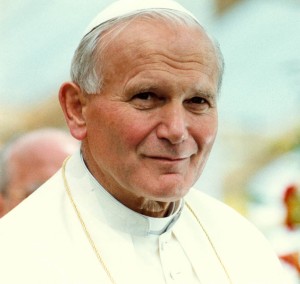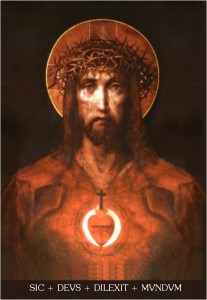 Pope John XXIII, before he was elected Pontiff, served as a diplomat. One evening, he was introduced at a function to a rather scantily clad woman. “Here”, the future Pope said to her, “Why not take a bite from this apple?” The lady looked at him quizzically. He responded, “If you eat it, perhaps, like Eve, your eyes will be opened and you will realize you are naked!”
Pope John XXIII, before he was elected Pontiff, served as a diplomat. One evening, he was introduced at a function to a rather scantily clad woman. “Here”, the future Pope said to her, “Why not take a bite from this apple?” The lady looked at him quizzically. He responded, “If you eat it, perhaps, like Eve, your eyes will be opened and you will realize you are naked!”
The Old Testament readings at Mass these days have been selected from Genesis. They deal with the origins of man and woman, nakedness and fig leaves, good and evil. There are several things we as Catholics need to understand about this book, and one of them is this:
The first three chapters of Genesis deals with the creation of the world from a poetic perspective.
Now, before anyone asks, I want to get one thing straight: the Bible contains real history. The Gospels, for example – biographies of the life of Jesus, who truly lived and died and rose again on planet earth. The Acts of the Apostles – the history of the early Church. There are, of course, many historical books of the Old Testament as well.
A key to biblical interpretation is this: understand the genre that you are reading. You don’t read poetry (Like the Song of Solomon) as you would a historical narrative. The problem with Genesis is that it is a hybrid of history and poetry (the first three chapters on Creation).
Catholics don’t run into the same sort of problems that some non-Catholic Christians do in dealing with creation from a scientific perspective (i.e. the young-earth theory, creation in six literal days, etc.). We see no conflict between faith and science. Some of the greatest scientists in the world were Catholics. A great number of craters on the moon, for example, are named for Jesuit scientist-priests who discovered them.
Science only describes how things work in God’s creation. But it can’t tell you the whys – the reason for our existence, and that of everything else. Genesis 1-3 does exactly that, using poetry. Genesis 1-3 is not a scientific document, or a documentary on how God created the universe and humanity. We know that it isn’t, for one simple reason (and there are more): the writer or writers of Genesis weren’t there, “in the beginning” to take notes!
But poetry can also communicate God’s truth, just as history can.
Christopher West, who has written so extensively on Pope John Paul II’s Theology of the Body, has a great way of explaining this: He says that there’s a big difference between what an optometrist (a scientist) tells you when looking in your eyes, and what your lover tells you when doing the same thing – unless, of course, you’re in love with your optometrist! But what both are seeing is true – just from different perspectives.
The writer of Genesis was a lover who sees the deep truths of why God made the world – and us. It was so that we could be in relationship with him.
 “‘And there appeared unto them cloven tongues like as of fire, and it sat upon each of them; and they were all filled with the Holy Spirit’ (Acts 2:3-4). They partook of fire, not of burning but of saving fire; of fire which consumes the thorns of sins, but gives lustre to the soul. This is now coming upon you also, and that to strip away and consume your sins which are like thorns, and to brighten yet more that precious possession of your souls, and to give you grace; for He gave it then to the Apostles. And He sat upon them in the form of fiery tongues, that they might crown themselves with new and spiritual diadems by fiery tongues upon their heads. A fiery sword barred of old the gates of Paradise; a fiery tongue which brought salvation restored the gift” (St Cyril of Jerusalem, Catechetical Lectures 17.15).
“‘And there appeared unto them cloven tongues like as of fire, and it sat upon each of them; and they were all filled with the Holy Spirit’ (Acts 2:3-4). They partook of fire, not of burning but of saving fire; of fire which consumes the thorns of sins, but gives lustre to the soul. This is now coming upon you also, and that to strip away and consume your sins which are like thorns, and to brighten yet more that precious possession of your souls, and to give you grace; for He gave it then to the Apostles. And He sat upon them in the form of fiery tongues, that they might crown themselves with new and spiritual diadems by fiery tongues upon their heads. A fiery sword barred of old the gates of Paradise; a fiery tongue which brought salvation restored the gift” (St Cyril of Jerusalem, Catechetical Lectures 17.15).

 You’ve no doubt heard about The Faith Explained Conference this Saturday, Sept. 27, featuring Cardinal Thomas Collins, Dr Craig Evans, and me. If you don’t have tickets yet, grab them at this link:
You’ve no doubt heard about The Faith Explained Conference this Saturday, Sept. 27, featuring Cardinal Thomas Collins, Dr Craig Evans, and me. If you don’t have tickets yet, grab them at this link:  Q. The movie Noah, starring Russell Crowe, has inspired me to look into the biblical Noah. What does the Bible say about Noah and the Flood in Genesis 6:5-8:22?
Q. The movie Noah, starring Russell Crowe, has inspired me to look into the biblical Noah. What does the Bible say about Noah and the Flood in Genesis 6:5-8:22?


